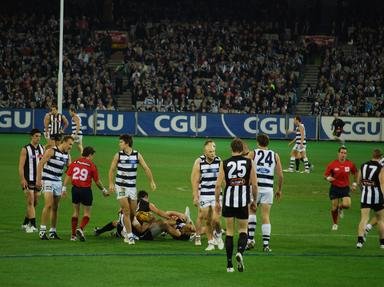Quiz Answer Key and Fun Facts
1. What happened that caused the controversy known as 'Sirengate' in Australian Rules football in 2006?
2. 'Sirengate' took place in round five of the 2006 season. Going into the match, how many wins and losses had the Dockers and Saints had that season?
3. At which AFL ground did 'Sirengate' occur?
4. Before the 'Sirengate' match, how many times had the Fremantle Dockers ended a game in a draw?
5. Who was the coach or official who was cited for interfering in the field of play by walking on to the ground before the match had been declared over by the field umpires?
6. Which player for St Kilda, who was benched by the coach during the match, allowed Fremantle Dockers to gain the lead early in the first half by giving away five free kicks? He was also reported for striking Dockers player Josh Carr.
7. After the controversy of the 'Sirengate'', the sirens were replaced. Which museum received them to form part of their display?
8. Who were the on-field AFL umpires on the day of 'Sirengate'?
9. What was the other significant event, also in Tasmania, that took place on 30 April 2006 in the hours after 'Sirengate'?
10. After the chaos of the events of 'Sirengate', on what date was the outcome of the appeal officially decided?
Source: Author
4sunflowers
This quiz was reviewed by FunTrivia editor
1nn1 before going online.
Any errors found in FunTrivia content are routinely corrected through our feedback system.
